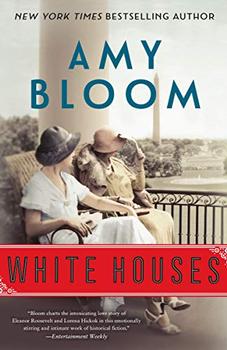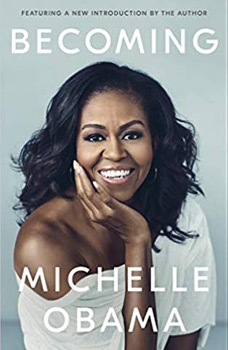Summary | Excerpt | Reading Guide | Reviews | Beyond the book | Read-Alikes | Genres & Themes | Author Bio

Eleanor Roosevelt, America's popular and longest serving first lady, the wife of President Franklin D. Roosevelt, is the subject of Amy Bloom's latest novel, White Houses. This is a story, however, that may surprise many readers, as it is told from the point of view of Lorena Hickok, Eleanor's close friend—and lover.
The true nature of the two women's relationship remains something of a mystery, although letters published in 1998 in the volume, Empty Without You: The Intimate Letters of Eleanor Roosevelt and Lorena Hickok, certainly indicate a loving and most likely, physical and romantic relationship. In White Houses, Bloom has accepted that theory and written a beautiful story of love and intense feeling.
The novel begins in April 1945, just two weeks after Franklin D Roosevelt's death. Eleanor is over sixty years-old and Lorena, whom Eleanor calls Hick, is in her early fifties. They meet in the Roosevelts' New York apartment for the first time in eight years and stay there for three days and nights. This "lost weekend" sets a frame through which Lorena reflects on and recalls key moments of their relationship with all the complexities of Eleanor's fame, marriage, family and public persona.
As a central character, Hick is appealing. Born into a poor family with an abusive father, she nevertheless built a career as a journalist in Washington D.C. with the Associated Press, a post she resigned in order to move into the White House and work for the administration. Within the White House, the intimacy between Eleanor and Hick was an open secret, something that would be unimaginable today, as were Franklin's affairs, most notably with his secretary Missy LeHand.
As the novel unfolds, moving back and forth through the years of the two women's relationship – sometimes, close and physical, sometimes distant and broken, Hick's deep and faithful love for Eleanor is beautifully portrayed. Their middle-aged closeness is tenderly described, for example when Hick says, "We give each other little kisses in odd places, the elbow, the shoulder, the chin. Years apart and other loves and still, I feel like my heart has at last, and only now, returned to my body." Her reflections on Franklin are also rich and intriguing. She describes him as "a terrible husband and an unnerving friend and my rival and my president," and she is as susceptible to his great charm and presence as anyone.
Hick also elicits the reader's sympathy as she accepts her life on the sideline—and the necessity of that position—given the Roosevelt's life of public service. Poignantly, for instance, she recalls dining at the White House with a party of sixteen: "Eleanor lifted a hand from across the room and I lifted mine back. The chances were pretty good that when the photo came out, in The Post or The Telegraph, I'd be cropped out of it."
Although their story is tethered by Eleanor and Hick's re-connection in New York after Roosevelt's death, at times the movements back and forth in their life histories are hard to keep track of and the narrative feels rather rudderless. The novel lacks plot and suspense—a thread about possible blackmail over their secret love by one of Eleanor's relatives, Parker Fiske, does not really deliver, for example. And while many of the characters are real historical figures, a few, including Parker Fiske, appear to be entirely fictional.
As the portrait of the life-long love of one woman for another, however—a love the reader hopes, although is not certain is returned in the same measure—White Houses is genuinely moving.
![]() This review was originally published in The BookBrowse Review in March 2018, and has been updated for the
October 2018 edition.
Click here to go to this issue.
This review was originally published in The BookBrowse Review in March 2018, and has been updated for the
October 2018 edition.
Click here to go to this issue.

If you liked White Houses, try these:

by Stephanie Dray
Published 2025
New York Times bestselling author Stephanie Dray returns with a captivating and dramatic new novel about an American heroine Frances Perkins.

by Michelle Obama
Published 2021
Winner of the 2019 BookBrowse Nonfiction Award
An intimate, powerful, and inspiring memoir by the former First Lady of the United States.
Your guide toexceptional books
BookBrowse seeks out and recommends the best in contemporary fiction and nonfiction—books that not only engage and entertain but also deepen our understanding of ourselves and the world around us.